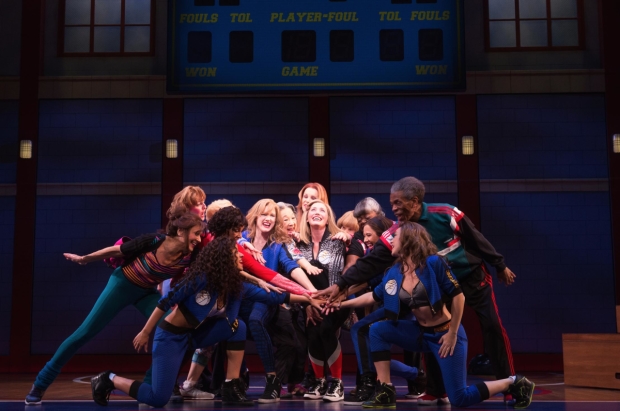Gotta Dance

(© Matthew Murphy)
The opening number in the Broadway-bound Gotta Dance is a straight-up homage to "I Hope I Get It," the iconic first number in A Chorus Line. But instead of lissome twentysomething dancers in their prime, Gotta Dance begins with a roomful of sixtysomethings trying to nail a step-kick-kick-leap-step-touch type combo. Any resemblance between the Pulitzer Prize-winning 1976 musical and Gotta Dance, however, ends there.
The musical follows a dance troupe of senior citizens hired to jump-start flagging fan enthusiasm for the Cougars, a New Jersey basketball team. The team is coached by Tara (Haven Burton), a former Cougar dancer who "aged out" at 27. The plot follows rehearsals as this group of old folks attempts to become more than the butt of a novelty-act joke.
There are so many rich ideas to plumb in the story of a dance troupe made up of senior citizens, but Gotta Dance's book (written by Bob Martin and Chad Beguelin) squanders its potential. While some issues facing senior citizens are addressed, such as the invisibility and irrelevance that those over 50 inevitably face in a culture obsessed with youth, the show fails to dig into them with any kind of nuance or significance.
Rather, it takes on an air of condescension with its senior characters by giving them personality traits and musicals tastes that are treated as the "adorable" eccentricities of an elderly person.
Take, for example, the main character, 67-year-old Dorothy (Georgia Engle). Dorothy's love of hip-hop is met with slack-jawed disbelief. The notion that somebody over 60 could even begin to understand – much less appreciate – Tupac Shakur and Biggie is utterly foreign to the characters in Gotta Dance. The audience is expected to gasp and giggle at the shocking spectacle of a senior whose musical tastes go beyond Lawrence Welk.
The supporting characters are similarly cloaked in stereotype. The Latina Camilla (Nancy Ticotin) gets a spicy salsa number. May (Lori Tan Chinn), who is of Asian descent, has the rhythm of a jammed metronome. There's also a Botox-filled meanie (Stefanie Powers) whose backhanded bitchery provides the minor conflict in the script. And the group's coach Tara (Haven Burton) is the perky one. Despite this, these seasoned actors manage to work beautifully with what they have. Ticotin blazes through her salsa with the sensuality of a siren. Tan brings bittersweet sorrow to the stage as a woman losing her beloved husband to Alzheimer's. And Engle's Dorothy has an innocence and an exuberance that's engaging. But even this talented cast can't overcome the shallow material.
In a reversal of the "show-me-don't-tell-me" rule, Gotta Dance is further hampered by the fact that we never see any of the seniors making progress with their dance skills until the final number. We never really see their journey to that triumph. It merely happens. But when it's showtime, everybody magically manages to pulls off a whizbang production number.
Director and choreographer Jerry Mitchell (Kinky Boots) has a proven gift for bringing humanity to the stage. But with Gotta Dance, he is saddled with a script that that lacks heart. This is also evident in the music. The show's original composer Marvin Hamlisch died before the show was completed (and is credited in the show with providing additional music only). Matthew Sklar is billed as the show's composer. Unfortunately, somewhere between the two men, the score turned into something largely forgettable. David Rockwell's set further cheapens the production. Simple, video projections provide the primary visual cues as the story moves from the basketball coliseum to a highway to Dorothy's home.
There's so much potential in a musical about the alternately joyous and heartbreaking rigors of aging. But Gotta Dance doesn't even begin to tap that unrealized possibility.










